Curriculum
Curriculum

Diverse knowledge cultivated through intensive study is put to use in practice
In addition to a comprehensive life sciences education, the college delivers a well-balanced range of specialist subjects in the chemical, biological, and therapeutic pharmacy and practicum programs that emphasize actual healthcare settings.
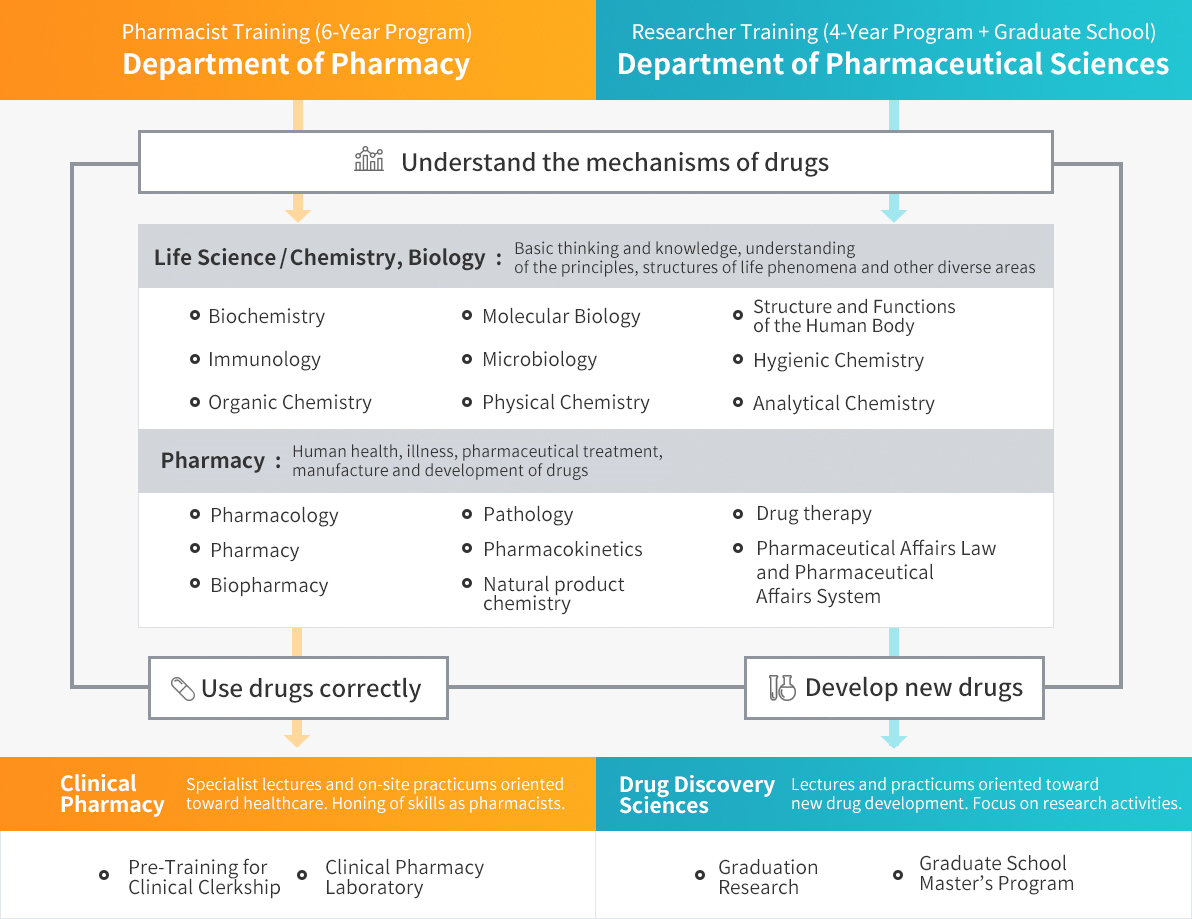

Study Flow
In addition to acquiring a wide range of knowledge in liberal arts subjects, students encounter the basics of the pharmaceutical sciences in Introduction to Pharmacy subjects. They systematically study chemical, biological, and therapeutic pharmacy from the introductory level to advanced levels as they progress through the program. In their Graduation Research, students conduct research on a particular theme and present their findings in the form of a thesis.
Study Flowchart for Department of Pharmacy

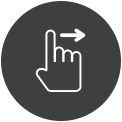
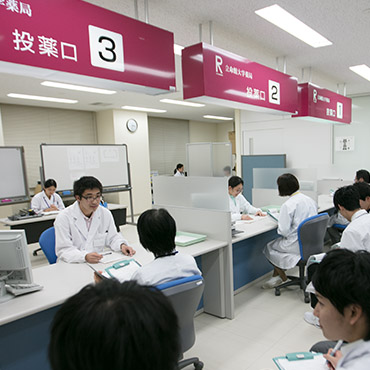
Early Hands-on Study
1st and 2nd Year students will have hands-on experiences of the work of pharmacists and drug-related jobs, helping them to formulate their vision of their future
After enrolment, students go through pre-practicum study, after which they visit companies, hospitals, and pharmacies and talk to the people working in those settings. At the report presentations on the last day of lectures, the students divide into groups to present their reports and deepen their understanding through active discussions. By visiting and experiencing the various workplaces where they themselves will one day work as pharmacists after graduation, the students become more conscious of themselves as students of the College of Pharmaceutical Sciences, which raises their motivation for their six years of university study. In the healthcare settings, they recognize the importance of a spirit of consideration and of communication and become aware of the importance of the role of the pharmacist in healthcare.
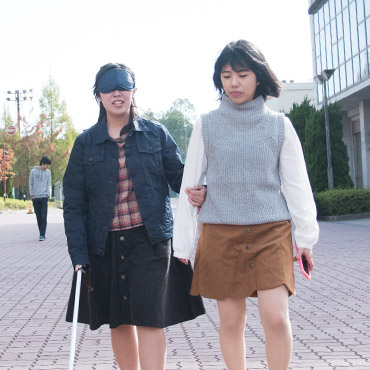
Practical, small-group education
Cultivating the attitude and sense of ethics befitting healthcare professionals
As a first step toward developing the communication skills that are essential for a pharmacist, 1st Year students take the Communication Seminar subject, in which they undertake practical study in small groups. In 2nd Year, they take the Pharmaceutical Advanced Seminar subject with the aim of developing the sense of ethics that is essential for pharmacists as healthcare professionals. In this subject, they visit welfare facilities, have handicap experiences, and observe an anatomy practicum. Through these experiences and through small group discussions, they are encouraged to develop more introspective thinking and make independent realizations, which are difficult to achieve in regular lectures.

Advanced Subjects
Elevate their abilities as pharmacists and acquire advanced expert knowledge and skills
In 4th and 6th year, before and after the professional practicums in hospitals and pharmacies, students take advanced subjects that are diverse and practical. Students select which advanced subjects to take according to the path they hope to take after graduation and acquire advanced knowledge that they can put to good use as professionals. The following four model subject selections are provided for students to refer to when choosing their subjects.
- Pharmacist working in a medical team in a hospital
- Pharmacist working in clinical research and trials in a hospital
- Pharmacist responsible for regional healthcare at a local pharmacy
- Pharmacist working in the clinical pharmacy domain in a company or government agency, etc.
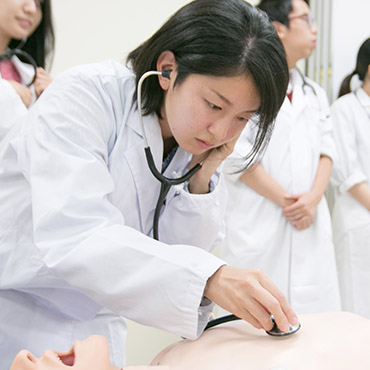
Practicum Programs
Through practicums at a hospital and pharmacy for about five months, students will learn about the duties and responsibilities of pharmacists
From the second semester of 4th Year, students take the Pre-Training for Clinical Clerkship Study subject in the mock pharmacy set up on campus. Under the guidance of professional faculty and lecturers who are licensed physicians, students learn properly how to behave as Clinical Clerkship in Hospital Pharmacy and Clinical Clerkship in Community Pharmacy. Students who have passed the Pharmacy Common Achievement Test (PhCAT), which is held in second semester of 4th Year undertake the Hospital and Pharmacy Professional Practicum, in which they spend a total of five months—2.5 months each at a hospital and a pharmacy. Working on the front lines of healthcare, they learn in more specific detail the skills and roles demanded of pharmacists and learn properly through practice the skills and attitudes befitting a pharmacist.
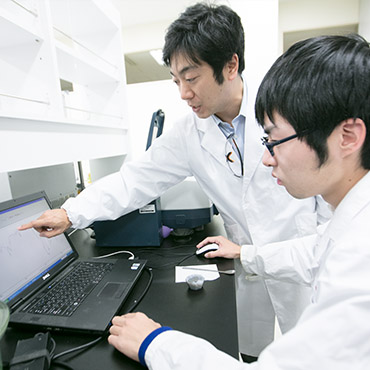
Comprehensive Pharmacy Exercise and Graduation Research
The culmination of six years of learning. Understanding the dual aspects of study and research in a practical way.
In 6th Year, students will compile the outcomes of their Graduation Research, which they have been working on for three years since 3rd Year, into a thesis and present those outcomes. Also, to give students a deeper, more comprehensive understanding of their learnings over the past six years, a Comprehensive Pharmaceutical Sciences Exercise subject is offered. Lectures and exercises are given by all full-time lecturers in the College of Pharmaceutical Sciences, giving students the opportunity to review in a comprehensive way the content of what they have studied since they first enrolled. Students graduate having definitely acquired the knowledge and skills that are required in actual healthcare settings.
Click on the link below for the curriculum.
Study Flowchart for Department of Pharmaceutical Sciences
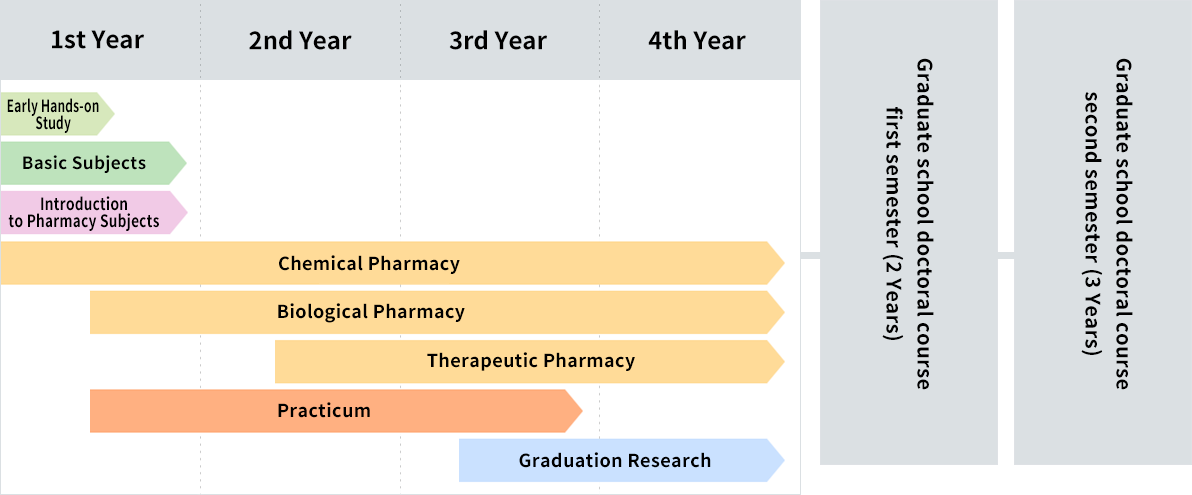

Acquisition of basic knowledge regarding new drug development
Study mathematics, physics, chemistry, etc. and develop the ability to think scientifically
In addition to English language subjects and a wide range of liberal arts subjects that only a general university can offer, students will build the foundations for their study through basic math and science subjects. Concurrently, they will start studying specialist subjects, with a focus on chemical pharmacy. In the New Drug Development Basic Exercise subject, through small group discussions (SGD), students investigate and discuss what kind of work, research, and other operations take place in pharmaceutical manufacturing companies and research laboratories. After that, they visit companies and research labs, where they learn about the actual processes of new drug development and about the roles of research laboratories. They then compile their findings into a report for presentation.
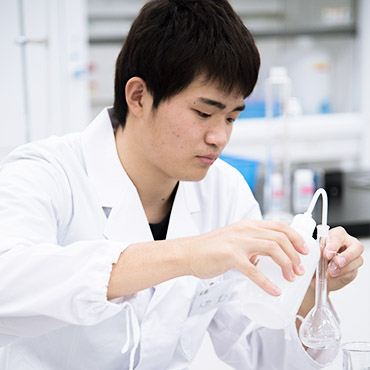
Chemical pharmacy and biological pharmacy subjects
Subjects for the study of specialist domains begin in earnest
Students study the specialist domains of chemical and biological pharmacy in a systematic way, preparing the foundations for their Graduation Research, which they will start in 3rd Year.
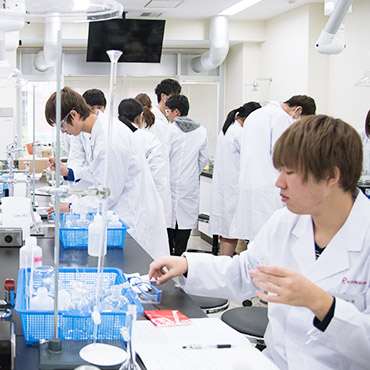
Systematic study based on model subject selections
Systematic study of specialist subjects
With the addition of therapeutic pharmacy subjects to the specialist subjects, the individual specialist subjects are studied in a well-balanced manner. Students engage in specialist study that is directly linked to new drug development, such as the Medicinal Chemistry Practicum. As reference for subject selection, three model subject selections are provided—new chemical drug researcher, new biological drug researcher, and clinical development/drug information officer. By taking subjects in line with these models, students will obtain the definite knowledge and skills for their chosen future career path. From second semester, they will be individually assigned to research laboratories, where they will engage in their graduation research on a theme that interests them.
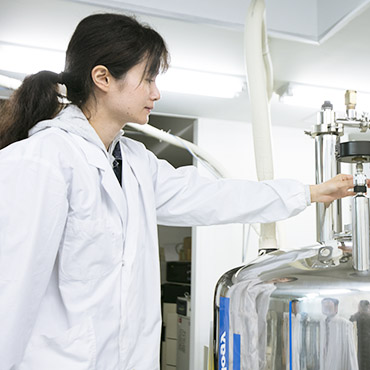
Graduation Research
The culmination of four years of learning
Students advance to graduate school with the aim of acquiring even more advanced knowledge. Leveraging the knowledge and skills they have acquired to date, students aim to complete their graduation thesis. They can also take subjects that are more highly specialized. After graduation, many students go onto graduate school (establishment of a graduate school for new drug development is currently under consideration), where they study in greater depth the fields and domains of “creating new drugs” and acquire more advanced expert knowledge and research capabilities. These students are expected to later play an active role as global professionals in companies and research institutes.
Click on the link below for the curriculum.
Department of Pharmaceutical Sciences(4 Years)
Curriculum [PDF]







